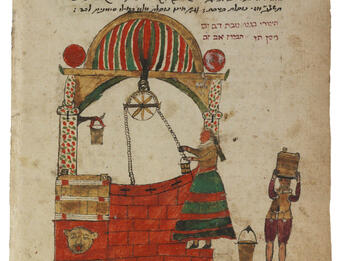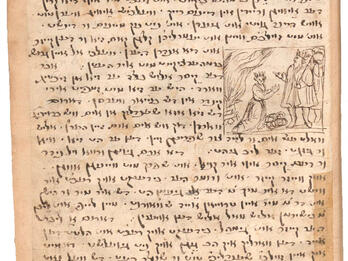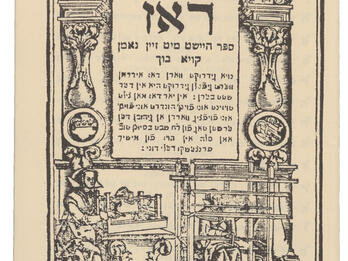Ma‘aseh Avraham avinu (The Tale of Abraham the Patriarch)
Unknown
Before 1519
They said that before Abraham was created, Nimrod denied belief in God, Blessed Be God, vaunted himself, and then asserted that he was a god. The ancients in his time used to worship and prostrate themselves to him. Now this king [Nimrod] was a cunning astrologer, who saw through the science of astrology that a man would be born in his day and…
Related Guide
Early Modern Jewish Languages
As Ashkenazi and Sephardi Jews migrated eastward, Yiddish and Ladino emerged as distinct languages. Both languages developed literary traditions, as print became more widespread.
Related Guide
Early Modern Literature and the Arts
Jewish literary creativity flourished in the early modern period, dominated by Hebrew poetry that blended religious themes with Renaissance forms.
This medieval midrash from Persia describes the birth and early life of the biblical Abraham and his encounters with the idolatrous king and astrologer Nimrod. Abraham emerges unscathed, and at the text’s conclusion, all Nimrod’s subjects declare their belief in one God. The text interweaves elements from the Targum, Talmud, midrash (particularly Genesis Rabbah), liturgy, and the Quran, as well as folkloric motifs. Likewise, echoes of other biblical books are evident: parallels to the story of Moses’ birth and the exodus from Egypt, while the depictions of the royal court and Nimrod’s attempts to kill Abraham echo the books of Esther and Daniel. The midrash constitutes a polemic against idolatry and a statement of belief in one incorporeal God. It also responded to the Islamic environment in which it was composed, which also lays claim to Abraham as a part of Muslim tradition. The text appeared in a midrashic compilation printed in 1580 in Constantinople (a shorter version was included in an anthology printed in 1519), and parts of it have been preserved in manuscripts. Some scholars argue that the text was originally written in Arabic and later translated into Hebrew.
Places:
You may also like

A Woman Drawing Water from a Well

Collection of Yiddish Stories from Southern Germany
A Tale of Mainz
Metsaḥ Aharon (Aaron’s Forehead)
Beri‘ah ve-Zimrah (Briyo and Zimro)



